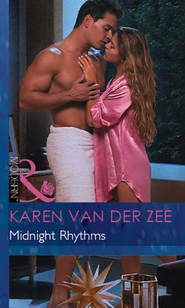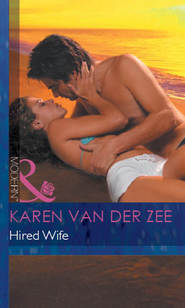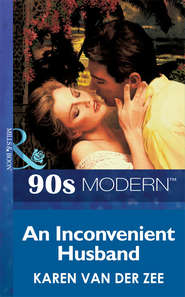По всем вопросам обращайтесь на: info@litportal.ru
(©) 2003-2024.
✖
The Other Man
Автор
Год написания книги
2018
Настройки чтения
Размер шрифта
Высота строк
Поля
“Gwen?” Aidan’s voice.
She bolted upright. “What are you doing here?” Her voice was sharp, out of control.
He shrugged, hands in his pockets. He advanced into the room. “I took a walk—it was a little longer than I intended. Everybody gone?”
She came to her feet. “Yes.”
“Your bodyguard, too?” A faint note of amusement. She didn’t like it, but she couldn’t think of a good retort, so she said nothing and just gave him a cool look.
He glanced down at the small table at the end of the sofa and studied the grouping of photographs arranged on it. She and Marc on a sailing boat, laughing, the wind in their hair. She and Marc sitting on a picnic bench, heads together conspir-atorially, his arm around her shoulders. Their wedding picture, both of them smiling. Joe had taken every one of them—beautiful photos, catching just the right expressions, just the right moods.
The air throbbed with tension. Her stomach churned with anxiety as she looked at Aidan’s rigid posture.
“You were happy,” he stated, a harsh edge to his voice, as if it were an accusation.
She swallowed painfully, her eyes on the photos, fighting a confusion of feelings—a struggle that knotted her stomach and made her chest hurt. The photos blurred in front of her and she clenched her hands into fists. She blinked her eyes, trying to focus on Marc’s face, but it was useless. Then she lifted her face to Aidan and met his eyes.
“Yes,” she said.
He studied her for a tense moment, taking in the red party dress, his eyes coolly disdainful. “You don’t look like a grieving widow to me.”
The words hit her like a fist in her chest, then fury flooded her. How dare he? How dare he judge her? She wanted to say something back, something sharp and damaging, but words failed her. The silence echoed with his voice, and the fury mixed itself with guilt, a toxic mixture that lodged itself in her throat, making her wild with a need to lash out.
Then a cry, a frightened cry coming from up-stairs. All thought of Aidan, of anger and revenge evaporated. Her body moved instantly, racing up the curving stairs to Churi’s room. She lifted the baby out of her crib and hugged her. “It’s all right,” she whispered. “It’s all right, sweetheart. Let’s go have some milk.”
Holding the whimpering baby against her shoulder, she went down the stairs, stepping more carefully now, afraid to trip over the long skirt of her dress.
Hands in his pockets, Aidan was standing in the middle of the living room, his face expressionless, his eyes the color of old pewter. He said nothing, and there was a curious stillness about him as he gazed at her holding the baby.
She drew in a steadying breath of air. “Get out of my house,” she heard herself say. Her voice was not her own. It was hard and frigid and she could not remember ever having spoken that way.
For a moment longer he just stared at the baby, then he turned sharply on his heel and marched out of the French doors into the garden.
How dare he? How dare he? For the next few days, the words echoed in her mind fueling her outrage. Anger was so much easier to deal with than the other emotions-—the pain, the longing, the fear. Easier than the devastating hunger she felt every time she looked at him. She could not allow herself to feel this way. It was wrong and dangerous.
On Wednesday she took Churi to the doctor for her scheduled checkup. She’d gained a pound. “Excellent,” the doctor said, smiling at her. “She’s doing great.”
Afterward they went to the small town’s only supermarket, crowded now with summer tourists who came to the beaches and the mountains. The store was full of the scents of suntan lotion brought in by the people and the fragrance of fresh bread baked on the premises.
With Churi propped up in the baby seat, Gwen pushed the shopping cart through the aisles, picking up bread and vegetables, diapers and baby food, all the while keeping up a conversation with Churi, who looked serious and drooled. A new tooth was coming through.
She met a friend and chatted for a while, dis-cussing babies and baby food brands, then headed for aisle nine to find a can of coffee.
She wasn’t the only one looking for coffee, but by the time she realized that one of the three people in the aisle was Aidan, it was too late to turn back; he’d already seen her.
Her heart skipped a beat and started a nervous gallop. Her legs felt oddly weak. Oh, God, she thought, this is so stupid, so stupid. Why does this happen to me? Why can’t I just stay calm? She clenched her hands tightly around the cart handle as she forced her gaze to pass over him casually, then return to the shelves.
“Hello, Gwen,” he said. So calm, so polite.
She looked back at him. “Hi,” she said coolly.
He studied the baby, who gazed back at him with dark, solemn eyes. Gwen glanced at the contents of his cart, seeing a big steak, jumbo shrimp, a bag of rice and assorted other groceries. Perhaps he and his wife took turns doing the shopping.
“How old is she?” he asked, and Gwen’s heart slammed against her ribs.
“Almost eight months. Excuse me.” She pushed the cart past his and kept on walking.
You should have told him. You should have explained.
I don’t owe him any explanations.
As she turned out of the aisle, Aidan’s wife turned in, a plastic bag of green grapes in her hand. Gwen kept on moving, pretending she hadn’t noticed her, her legs wooden, her chest aching.
At home, she made herself a cup of coffee and a sandwich and fed Churi her lunch. After a nice long cuddle, she tucked her in bed for her afternoon nap.
She had to try not to think about Aidan. She had work to do. She wanted to sell the house. Which meant she’d have to find another place to buy. What place? Where? A little closer to the beach, but not too far from school. Something simple and comfortable and not too big. She’d have to do some looking around, check with a real estate agent. Which one? Joe would know.
“You want what?” he said after she told him of her intentions.
“A real estate agent, to help me sell the house,” she repeated. “It’s too big, too fancy for me, Joe.”
Joe was silent. Joe had been Marc’s best friend and she knew what was going through his head. Marc had designed that house for them. They’d lived there almost all their married life.
“I have to move on, Joe,” she said quietly.
“Yes, yes, of course.” He was all business sud-denly, giving her the name and phone number of an agent he knew personally.
“Have you thought about my idea for the next book?” he asked then.
She hadn’t thought about anything but Aidan and the baby in the last few days. “I’m sorry, I haven’t,” she admitted. “Maybe we should see first how well this one sells. It’s only a couple of weeks before it’s out.”
“Yes, of course. I was just thinking of the possibilities.”
After they’d hung up she glanced around the house. She’d have to sell or give away a lot of the furniture when she moved to a smaller place.
A place of my own. All my own. Guilt swamped her suddenly, settling like wet cement in her heart. Marc had given her a home, love, security, stab-ility. All the things the scared little girl inside her had needed and craved. All the things her mother had said to look for. No, that was not true.
Her mother had not believed in love.
Love was an overrated, dangerous emotion that existed only in people’s fantasies. Love invariably caused grief and disillusionment. Love did not keep food on the table or a roof over your head.
Her mother had been a very disillusioned person.
That night she dreamed of her mother. She looked very old and gray, lying in a white hospital bed, her skin sallow. Her mother was crying. Her mother never cried.
“And what about me?” she was saying over and over again. “What about me?”
“I’m not leaving, Mom. I’m here.” Gwen searched for her mother’s hand. It wasn’t there. She broke out in a cold sweat, searching every-where under the covers. She couldn’t find it any-where. “I’m not leaving, Mom. Give me your hand. Please, Mom, give me your hand.”











